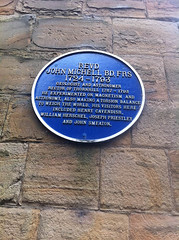Rev John Michell FRS
Rev John Michell FRS
(1724-1793)
Commemorated on 1 plaque
Revd John Michell BD. FRS 1724-1793 geologist and astronomer. Rector of Thornhill 1767 - 1793. He experimented on magnetism and astronomy, also making a Torsion balance to weigh the world. His visitors here included Henry Cavendish, William Herschel, Joseph Priestley and John Smeaton.
Thornhill Parish Church, Church Ln, Thornhill, Dewsbury, United Kingdom where they was

